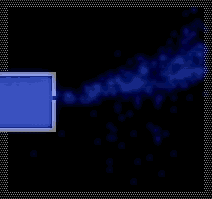Difference between revisions of "Element:HYGN"
m (desl+hygn is possible) |
m (moved save id to the examples) |
||
| Line 46: | Line 46: | ||
When hydrogen is met with [[Element:O2|O2]] and set alight with [[Element:FIRE|FIRE]], it burns into [[Element:WTRV|WTRV]]. Hydrogen has no effect on pressure and can come in contact with [[Element:QRTZ|QRTZ]] at sub-zero temperatures. | When hydrogen is met with [[Element:O2|O2]] and set alight with [[Element:FIRE|FIRE]], it burns into [[Element:WTRV|WTRV]]. Hydrogen has no effect on pressure and can come in contact with [[Element:QRTZ|QRTZ]] at sub-zero temperatures. | ||
| − | When hydrogen comes in contact with [[Element:DESL|DESL]] at greater then 8 pressure, it turns itself into [[Element:OIL|OIL]] and the diesel into [[Element:WATR|WATR]]. The problem with this reaction is that [[Element:DESL|DESL]] turns into fire at greater than 5 pressure, so this reaction is very hard to do. You have to make it convert before the DESL lights on fire, and get the reactants out safely. | + | When hydrogen comes in contact with [[Element:DESL|DESL]] at greater then 8 pressure, it turns itself into [[Element:OIL|OIL]] and the diesel into [[Element:WATR|WATR]]. The problem with this reaction is that [[Element:DESL|DESL]] turns into fire at greater than 5 pressure, so this reaction is very hard to do. You have to make it convert before the DESL lights on fire, and get the reactants out safely. |
===[[Fusion]]=== | ===[[Fusion]]=== | ||
| Line 66: | Line 66: | ||
| This save shows off hydrogen fusion, using [[Element:PUMP|PUMP]] to get the pressure needed, and showing all the steps of fusion | | This save shows off hydrogen fusion, using [[Element:PUMP|PUMP]] to get the pressure needed, and showing all the steps of fusion | ||
| {{ save | id=731553 }} | | {{ save | id=731553 }} | ||
| + | |- | ||
| + | | This save shows off the fact that the reaction between DESL and HYGN is possible, but just extremely difficult. | ||
| + | | {{ save | id=1061712 }} | ||
|} | |} | ||
| + | |||
== Properties == | == Properties == | ||
Revision as of 14:01, 28 January 2013
 Combines with O2 to make WATR | |
| Properties | |
|---|---|
| Section | unknown Expression error: Unrecognized punctuation character "{". |
| Spawn temperature | 22°C |
| Heat Conductivity | 100% |
| Relative weight | 1 |
| Gravity | 0.00 |
| Acid dissolve rate | 0% |
| Flammability | 0 |
| State | Gas |
| Source code | |
Creation
During an electrolysis reaction with IRON, hydrogen and OXYG are formed from the products of water. Hydrogen has a 2/3 chance of being produced, oxygen has a 1/3 chance.
When One neutron and one electron touch, they combine and form hydrogen.
Reactions
When hydrogen is met with O2 and set alight with FIRE, it burns into WTRV. Hydrogen has no effect on pressure and can come in contact with QRTZ at sub-zero temperatures.
When hydrogen comes in contact with DESL at greater then 8 pressure, it turns itself into OIL and the diesel into WATR. The problem with this reaction is that DESL turns into fire at greater than 5 pressure, so this reaction is very hard to do. You have to make it convert before the DESL lights on fire, and get the reactants out safely.
Fusion
When hydrogen is over 50 pressure and heated to over 2,000 degrees, it will transform into NBLE and release one NEUT, one yellow PHOT, and have a 10% chance of releasing one ELEC. It will also generate one particle of PLSM, add 30 pressure, and raise its own temperature by 1000±250 °C.
Since NEUT and ELEC transmute to hydrogen, the process may self perpetuate.
Flammability
Hydrogen does not burn like other elements do and is not listed as being flammable in the source code. It uses its own method in order to allow it to react with oxygen, and in order to allow for fusion, it also only burns when lower than 2000 °C. It will only burn from FIRE, PLSM, and LAVA
Examples
| This save shows off how to make hydrogen from NEUT and ELEC, and also how to convert it into WATR | 673260View save 673260
|
| This save shows off hydrogen fusion, using PUMP to get the pressure needed, and showing all the steps of fusion | 731553View save 731553
|
| This save shows off the fact that the reaction between DESL and HYGN is possible, but just extremely difficult. | 1061712View save 1061712
|
Properties
test, incomplete table
| Hidden | No |
| Enabled | Yes |
| Section | Gases |
| Advection | 2.0 |
| Airdrag | 0.00 |
| Airloss | 0.99 |
| Loss | .30 |
| Collision | -0.10 |
| Gravity | 0.00 |
| Diffusion | 3.00 |
| Hotair | 0.000 |
| Falldown | 0 |
| Language: | [[::Element:HYGN|English]] |
|---|